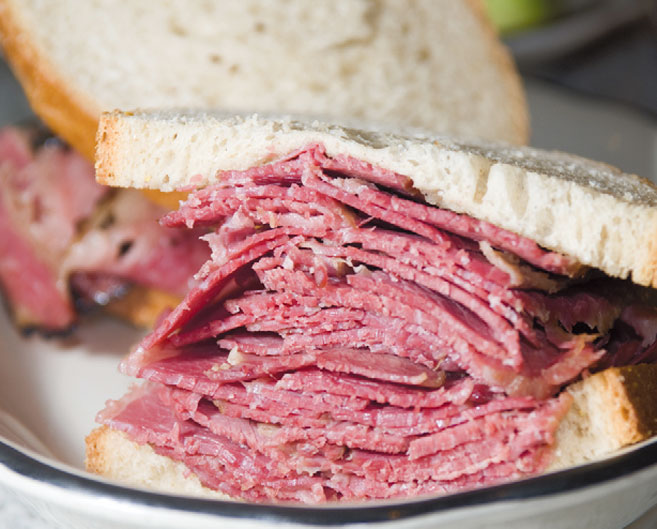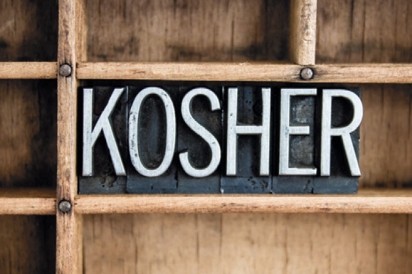Keeping Kosher
Keeping Kosher/Kashruth In The Valley
(Editor’s Note: This article is not meant to be a scholarly treatise but rather an introduction and explanation about some of the dietary laws that are known as kashruth or kosher.)
You’ve seen the commercial: Hot dogs that “answer to a higher authority.” They’re kosher hot dogs, specially prepared with ingredients that comply with Jewish dietary laws. What exactly does that mean?
Whether you are Jewish or not, whether you have been aware of it or not, we have all eaten kosher foods. Maybe it was a pastrami sandwich at a deli or a loaf of bread from the supermarket or one of those hot dogs that answer to a higher authority. Kosher food may sometimes taste a little different from its non-kosher counterpart because of the ingredients or the way it’s been prepared. For the most part, though, it can be difficult to determine if one food is kosher and another is not just by looking or even after tasting.
I know there’s a lot of confusion about what “kosher” actually means. I know because my mother, who was brought up in a kosher home, was often confused about what was kosher. For her, it was tradition that dictated what was kosher so if something was not a traditional food then she considered it not kosher. Easy, but far from accurate.
The first time I brought my boyfriend (who later became my husband) home to meet my mother, she offered him a roast beef sandwich. Our family would have eaten such a sandwich on white bread with mustard. My husband requested mayonnaise. Mayonnaise is white. To my mother, all white foods were dairy hence to her thinking he was requesting a meat sandwich mixed with dairy (forbidden according to Jewish law). She was certain he was not Jewish. We all know that mayonnaise is not a dairy food but in those days ingredient labels were not as explicit nor did my mother bother with such things when she shopped except to make sure that something was kosher (which in those days meant she bought it at a grocery that sold only kosher food). Luckily we were able to disabuse her of her mistaken notion and I later went on to marry the mayonnaise-and-meat-eating boyfriend (who still insists on using mayonnaise on meat sandwiches).
So what is kosher? Why do observant Jews eat kosher food? How do local businesses offer kosher food?
Kosher (also known as kashruth) rules are dietary laws given to Moses by G-d and written in the first five books of the Torah (what many people refer to as the “Jewish Bible”).
The Torah forbids the eating of pigs, bugs, shellfish, aquatic mammals, birds of prey, camels, hares, rodents, amphibians and reptiles. The Torah also forbids the eating of milk and meat in combination and does not allow the eating of blood. The consumption of milk and meat together extends to the use of utensils as well so that a dish or a fork or a pot that is used for eating any meat dish cannot also be used to eat something that contains dairy or milk foods.
The Torah also specifically explains that an animal must be slaughtered in a humane fashion that minimizes its distress and pain. After slaughter, the flesh is salted and the blood drained.
But understand that even if an animal is properly slaughtered or a processed food is manufactured with only kosher ingredients, it still may not be considered kosher. Someone, often a rabbi, with special training, must either inspect the facility where the animal is slaughtered or the factory where the food is manufactured and/or be present during the slaughter and manufacture of the food to be certain that dietary laws are being followed. In the Valley, the Vaad Hakashruth of Phoenix, a local nonprofit organization dedicated to promoting kashruth, provides certification that the rules have been followed and the food is indeed kosher.
Why follow Jewish dietary laws? According to Rabbi David Rebibo, who oversees the Vaad Hakashruth of Phoenix, “Being kosher is part of being Jewish. It is part of our tradition. Kashruth refers not just to what can and cannot be eaten but also to the way an animal should be treated.” Jews have followed these rules for centuries even under conditions so harsh that finding food was difficult and finding kosher food was almost impossible.
When finding kosher food is a problem, falling back on foods that are always allowed like most fruits and vegetables is the way to go. And, indeed, many Jews follow a vegetarian or vegan diet just to make their lives easier (and also because of the proscription against harming animals). If you stick to fruits and vegetables, you don’t need to read a label or shop in a special store or worry about contamination by something that is not kosher.
Rabbi Rebibo offers some insights into why following kosher dietary laws might be good for all of us: “Animals spend most of their time looking for food. They exist to eat. Man, made in the image of G-d, is different. He eats to preserve his energy and to comply with divine instructions. Man eats to have energy to perform his duties. G-d chose to advise man about what is good for him and not good for him but these suggestions are not based on scientific information. Still, the Torah does emphasize eating fruits and vegetables so in effect G-d might have been telling the Jews to eat a healthy plant-based diet.”
During my mother’s time, it was much easier to keep a kosher home. There were less processed foods and fewer decisions to be made at the supermarket. My mother prepared pretty much everything at home from scratch, especially all baked goods, so she was sure that her food was kosher.
Nowadays, the number of items found in a typical supermarket can number over 50,000 with almost 30% of those foods having kosher certification. How do you know if what you’re buying is kosher or not? The same way you know if a food is a good source of protein or low in fat: Read the label.
The following symbols found on food labels indicate that a food is certified kosher: A “U” inside a circle; a “K” inside a circle; a “K” inside a star. (Symbols vary by certifying authority.) Many of us, maybe not intending to buy kosher food, do so all the time because so many products in the supermarket are kosher. Check the labels the next time you are shopping and look for the symbols.
It may seem pretty simple: Just read some labels and make sure to buy your meat where kosher meat is sold and keep dairy and meat separate. Of course, there’s more to living a kosher life than that.
Mussie Levertov, director of Aleph Bet Preschool and Jewish Women’s Circle of Phoenix, keeps a strictly kosher home. Being kosher comes naturally to Mussie because she was raised in a kosher home. She moved into a recently remodeled home across the street from me. Oftentimes when a kosher family moves into a home previously occupied by someone who was not kosher, there’s a lot of work to do to make the kitchen kosher. Mussie explained that the counters, depending on their composition, will have to be made kosher. That’s usually done by covering the counters with boiling hot water and then going over the counters with a hot iron. The same for the sinks (most kosher homes have 2 sinks, one for dairy and one for meat as well as 2 dishwashers) and any other hard surfaces where food will be prepared. The oven just has to go through a clean cycle to make it ready for kosher food.
Kosher families will have two sets of dishes, silverware, glassware, pots and pans: one for meat and one for dairy. (In fact, they usually have more than that because separate dishware is necessary for the holiday of Passover.) The dishes are washed separately and stored separately. Should a dish used for dairy come in contact with one used for meat, it will either have to be made kosher again through the heat process similar to the one described above or it can be put away for one year after a thorough cleaning, after which it will be OK to use it again.
Nowadays not everyone eats all their meals at home. And with lifecycle events like bar and bat mitzvahs and weddings as well as all-day professional meetings and seminars, everyone eats out occasionally. For a person who follows the dietary laws of kashruth, that could present a problem.
Indeed, there are people who follow the rules at home but will eat out at restaurants that do not serve kosher food. Because, as with many religious rules, not everyone follows the rules to the letter all the time although many do. Generally, people who follow dietary laws at home but are willing to bend the rules a little when they are out will order vegetables and potatoes or rice because those are always kosher (unless they’re prepared with non-kosher ingredients). But for the more observant, eating away from home can be difficult.
The Vaad Hakashruth of Phoenix oversees and certifies restaurants, food manufacturing facilities, hotel dining facilities, school kitchens, etc. “Even if only 10% of attendees at a meeting observe kosher laws, the organizers try to do their best to make sure that everyone is comfortable and can participate. Phoenix has become a destination for many big events so inspecting and certifying these venues has become very important,” says Rabbi Rebibo. Most of the bigger hotels in town have separate kitchens for preparing kosher meals and others will order in special kosher meals for attendees if the facility cannot provide them.
To someone not steeped in this tradition, the rules and rituals of keeping kosher might seem tedious and illogical. But for people who follow this practice it is a way to honor and continue their ancient heritage—and to eat foods that nourish both body and soul.
Selected Kosher Food Establishments in Phoenix
Cookies from Home
Fairytale Brownies
Fresh Mint
Hillel at ASU
Imperial Kosher Deli
La Bella Pizzeria
Levi Cafe and Catering
NY Bagels N Bialys
Pardes School
Segal's
Zoyo Frozen Yogurt






